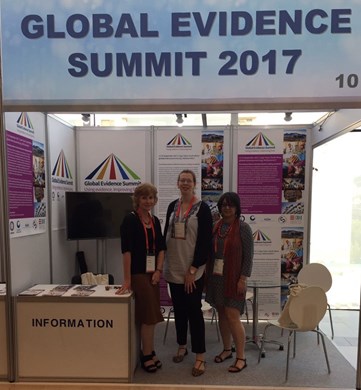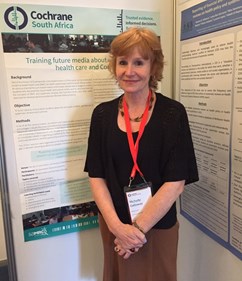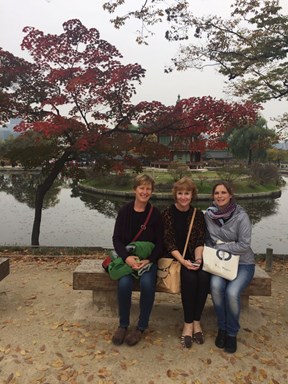Cochrane Colloquium 2016 highlights challenges in accessing data, using technology to speed up reviews, and getting the right reviews to the right people
Tuesday, 24 Jan 2017 The Cochrane Colloquium held in Seoul, Korea from 23 to 27 October 2016, was attended by 850 delegates from 54 countries, and highlighted the current challenges in evidence-based health care. In particular, it focused on different approaches to improve the quality, timeliness, and usability of Cochrane reviews. Broad challenges, including overdiagnosis, data transparency, and knowledge translation, were clearly stressed in plenary and special sessions.
The Cochrane Colloquium held in Seoul, Korea from 23 to 27 October 2016, was attended by 850 delegates from 54 countries, and highlighted the current challenges in evidence-based health care. In particular, it focused on different approaches to improve the quality, timeliness, and usability of Cochrane reviews. Broad challenges, including overdiagnosis, data transparency, and knowledge translation, were clearly stressed in plenary and special sessions.
The issue of too much information but not enough access to all the information was highlighted. As Lesley Stewart said: “We are basing reviews on what might be the tip of the iceberg because not all trial results are published.” “Now is a good time to take stock of access to open and shared data,” she continued. “We have to continue to insist on open science,” added Kay Dickersin. “Probably only 60% of data are published in full.”
“More than 100 trials appear each day. Over two million citations are screened each year for Cochrane reviews,” said James Thomas. “Only a fraction of the available studies are included in systematic reviews. Resources are limited and the model is unsustainable which means we have to develop and use technology to automate wherever possible.” He emphasised the need to identify technologies to enable study identification and get studies done more quickly. “We need people and technologies working together to maximise scarce human efforts,” he said.
But speed can never mean reduced quality. This was stressed by Karla Soares-Weiser who said: “We have to increase efficiency and create a more rapid pipeline while maintaining methodological standards.”
The need to make use of empty reviews to promote primary research was also highlighted. However, Claire Glenton stressed that detailed direction about the kind of research needed is also important. “More research is needed is not a useful message for policy makers,” she said.
Continuing on the theme of more research Davina Ghersi pointed out that: “All research grant applications should include a systematic review of all current evidence to help decide if the research is needed.”
The need to do more reviews incorporating unpublished patient data as well as data from animal studies was discussed. Increased monitoring of trial registries was also proposed as a counter to publication bias in favour of positive trial results.

The Global Evidence Summit stand at Cochrane Seoul (L-R) Michelle Galloway, Holly Millward, and Joy Oliver
Convincing people to use evidence in practice
Quality knowledge translation was emphasised by John Lavis who pointed to the need for optimal retrieval of high-quality, appropriately packaged materials. “Policy makers should be able to reach into our world and pull out relevant evidence but we have to make it easy for them – we have to know what the message is, to whom it should be directed, and by whom it should be delivered,” he said.
Although conceding that decision making is based on many factors of which evidence may only be one, Maureen Dobbins emphasised that: “We must ensure that public health officials know that they are looking at the best-available evidence.”
“We need to present results in multiple formats of varying layers of complexity,” said Glenton. “Information about the effect or result should always be presented alongside information about the certainty of the evidence.” Speaking from the viewpoint of a health care manager, Marguerite Koster pointed out that some of the issues that are factored into deciding whether review findings will be implemented include the strength of the evidence; stakeholder needs and preferences; whether the intervention can be implemented practically in the system and within current practices; patient values and experiences; and, the cost of implementation.
 Pictured right: Michelle Galloway presenting a poster on training journalism students at Cochrane SA
Pictured right: Michelle Galloway presenting a poster on training journalism students at Cochrane SA
Knowledge translation was a recurring discussion point at the Colloquium. Cochrane is in the process of developing their Cochrane Knowledge Translation Strategy which will define the role of knowledge translation for Cochrane, provide a framework to coordinate these activities across the organisation, and support those who are well-placed to undertake this role. A consultative knowledge translation symposium was held to engage those present on the findings of a situational analysis to date, and enlist ideas and support to take it forward.
The right test at the right time for the right patient
The plenary on overdiagnosis offered fascinating insights into how increased screening, genomic testing, broadened disease definitions, more sensitive technologies and awareness means that many diseases can be diagnosed and treated much earlier, however, the negative side was also highlighted which includes testing without available treatment, labelling people with illnesses and treating for illnesses which may never fully manifest in disease. Alexander Barratt stressed that diagnosis should always be about improving health. “Diagnosis shouldn’t just be focused on finding more disease,” she said. “The more we test, the more we find the slowly progressing disease but without treatment there is no improvement in health. Disease incidence and costs increase with no change in disease outcomes.” “We are facing an epidemic of pre-disease – like pre-diabetes,” added Jenny Doust. Glenton also pointed out that: “More diagnosis can lead to more labelling but with no improvement in health. Labelling can lead to psychosocial harms.”
This was stressed by Rita Redberg who said that: “Medical care should be about the right test and the right treatment for the right patient at the right time.” “If a test has no known benefit it shouldn’t be done,” she continued. “The assumption is that if some medical care is good then more care is better. New technologies may not always be better. Prevention shouldn’t be just about more screening, it should also be focused on lifestyle choices and public health measures.”
The speakers agreed that Cochrane should undertake reviews addressing overdiagnosis, that overdiagnosis and overtreatment should be routine outcomes in all systematic reviews – and that there is a need to develop methods to do this.
 Beautiful Seoul (L-R) Sylvia de Haan, Michelle Galloway, and Tamara Kredo
Beautiful Seoul (L-R) Sylvia de Haan, Michelle Galloway, and Tamara Kredo
Keeping the dream alive
At the Cochrane AGM, data were provided on progress in the organisation. This included a 45% increase year-on-year in use of the Cochrane Library; increased access to the Cochrane website in particular from non-English speakers, and the fact that 90% of WHO Guidelines now reference Cochrane. “Cochrane has produced an enormous body of work of which we can be proud,” said CEO Mark Wilson. Continuing on this theme in the Annual Cochrane lecture Paul Glasziou said: “Without the enormous methodological leadership of Cochrane, much progress would not have happened.” “Now we need to speed up the process despite the huge challenges,” he continued. He pointed to areas that need ongoing attention including improved dialogue with clinicians, shared decision making with patients, taking non-drug interventions as seriously as pharmaceuticals, and investment in automating evidence synthesis. He also pointed to the work of reviewers saying: “Volunteer reviewers are Cochrane’s greatest strength – we have to try their skills not their patience.” “It is a great dream,” he concluded. “Don’t give up on it.”
Michelle Galloway and Tamara Kredo
Cochrane SA
This article was first published in the Cochrane South Africa newsletter, Volume 18, No. 2 December 2016 and republished here with kind permission from Cochrane South Africa.
Tag Cloud
